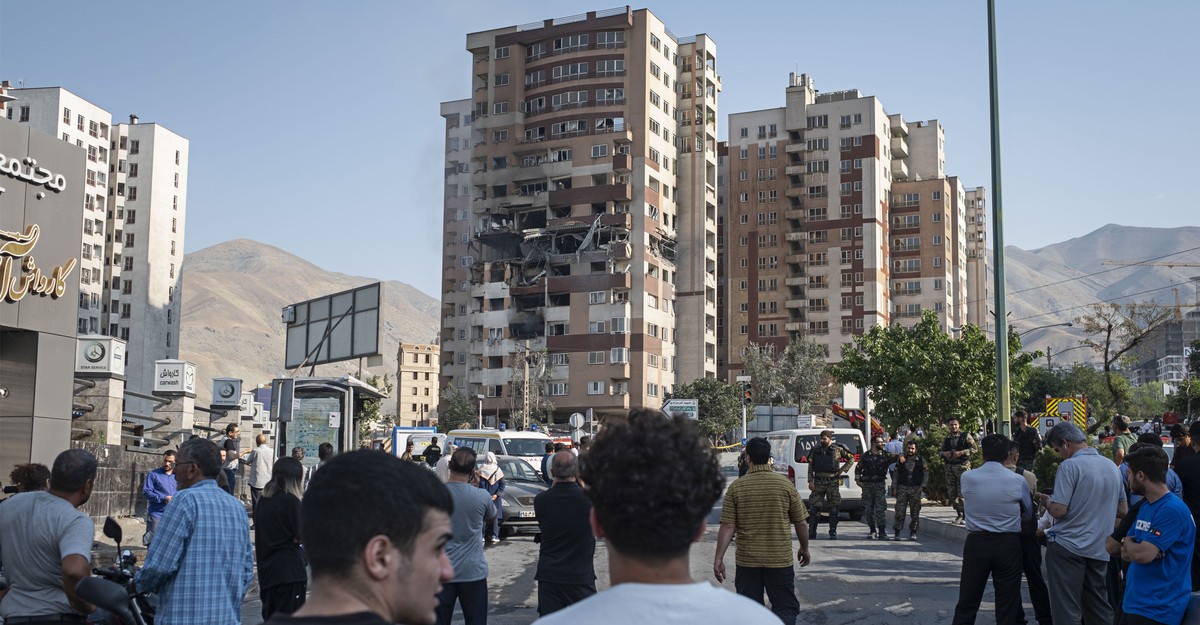News of the Israeli attacks on Iran reached me in the United States just before 5 a.m. Tehran time. The city had been hit in multiple places, and strikes meant for Iran’s military commanders and nuclear scientists had brought down residential buildings across the city. So I figured my friends and family in the Iranian capital would be awake. I rushed to call.
To my shock, I woke several of my relatives. They hadn’t heard anything. No sirens had sounded; there had been no rush to shelters. The number of civilian casualties so far seems to be relatively low, but every lost life hurts. Online, the stories circulate—of a young woman who loved cycling and ecotourism, of children found under rubble. I spoke with a friend whose close relative suffered a miscarriage last night, in her eighth month of pregnancy.
Iranians have the right to condemn Israel for the attacks. But what was their own government doing to protect them?
Everything about the June 13 attacks speaks to the Iranian regime’s incompetence. Israel was able to hit major nuclear and military sites all over the country in the space of a day. It has taken out dozens of high-ranking military and nuclear officials. The list includes Ali Shamkhani, one of the most powerful men in Iran’s military, political, and economic firmaments. Among other portfolios, he was in charge of Iran’s nuclear talks. Shamkhani was also a longtime commander in the Islamic Revolutionary Guards Corps, the militia that undergirds the power of the Iranian regime. The IRGC lost its chief and several of its top commanders in the Israeli assault. Consider this: The Islamic Republic wasn’t even able to protect its own brass, let alone the people of Iran, to whom it has long shown nothing but contempt.
The Iranian regime’s utter ineptitude is matched by a record of belligerent action and rhetoric. Supreme Leader Ayatollah Ali Khamenei was the only world leader who celebrated Hamas’s October 7 attacks on Israel. His state armed Hamas and a host of other militias in the region. For years, he has promised to bring destruction to Israel. In 2018, faced with the first Trump administration, he gave an ominous double pledge: “There will be no war; nor will we negotiate with the U.S.”
[Read: Israel’s bold, risky attack]
In the end, Khamenei was forced to negotiate and still couldn’t avoid war. Although the United States did not participate in the Israeli attacks, Donald Trump is now gloating about their success. The next round of talks between Washington and Tehran were scheduled for Sunday in Muscat; now Trump is telling Khamenei that he should have taken the president’s repeated threats more seriously and moved faster to reach an agreement.
Israel has only just begun a long campaign—one that it says will go on for at least two weeks. Iran has promised harsh retaliation, but it has woefully few options. The last time its territory was attacked at such a scale was when Saddam Hussein’s Iraq invaded Iran, in 1980. Now the regime appears to be in shock, taking the time to lick its wounds before it acts.
Iran has been facing down a crisis over succession to the 86-year-old Khamenei for some time. Now the old Grand Ayatollah appears to be watching feebly as Israel brings blow after blow on his regime and its so-called Axis of Resistance, the collection of militias Tehran has backed throughout the Middle East. Once celebrated as Khamenei’s crowning achievement, the Axis now lies in ruins. Last year, Israel killed Hassan Nasrallah, the leader of Lebanon’s Hezbollah. The group that was long Iran’s most powerful weapon against Israel is now so weakened that it has said it won’t join any counterattack on Iran’s behalf.
Could Iran see a change in leadership in the coming days? To imagine a new group of military commanders taking the reins, whether formally or informally, is not all that far-fetched. Given Israel’s apparently thorough intelligence penetration of Iran, one could even speculate that it might help engineer such changes itself.
Barring a dramatic transformation, however, Iran’s leadership will have a decision to make. The country has its back against the wall. As limited as its options are against Israel, it might still try to strike as hard as it can. It might attempt to launch cyberattacks on Israeli infrastructure. It could also make the fateful decision to dash for a nuclear bomb—but that’s a process that could take years. If Israel can figure out where the IRGC’s leaders live and how to kill them, surely it can also put a stop to such plans. Iran might hope that it can wear out Israel’s resolve over time, but that’s a gamble that hasn’t worked out so well for Iran thus far.
Iran might also attempt to attack American bases in the region, or to strike Gulf countries allied with the United States. The latter possibility explains why several Gulf countries have normalized relations with Tehran and strongly condemned the Israeli attacks. Taking the war to these countries could drive up oil prices and hurt the global economy. It would also involve the U.S. more directly and make still more adversaries for Iran.
Another course is possible. Maybe the time has at last come for the brittle, ideological, postrevolutionary regime to surrender. Maybe a new, pragmatic leadership will emerge—one that realizes that the time has come for Iran to stop picking fights, end its global isolation, and pursue its own development.
Despite all our differences, Iranians are a patriotic people. We don’t want to see our country so easily laid open to foreign aggression, so hopelessly incompetent in the face of fire. Iranians deserve a leadership that can defend its people and territory and that seeks peace with the region and the world. In the coming days, perhaps they will strike a path to get there.
From The Atlantic via this RSS feed
Fucking wow.


